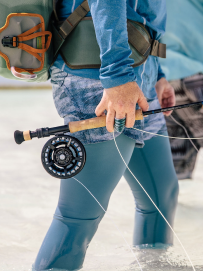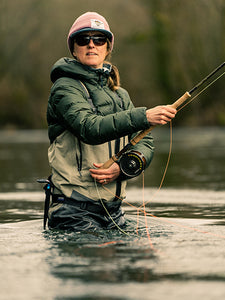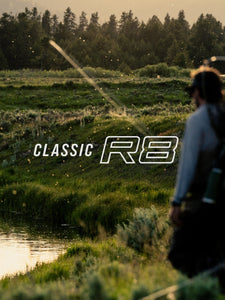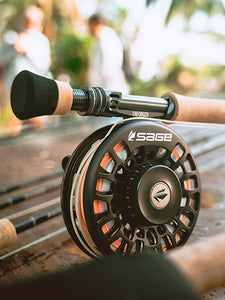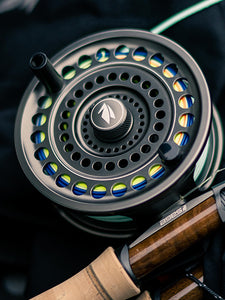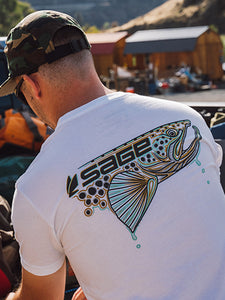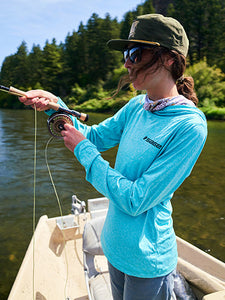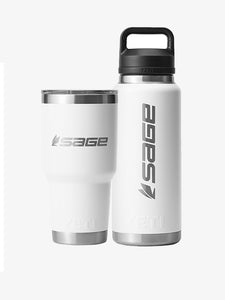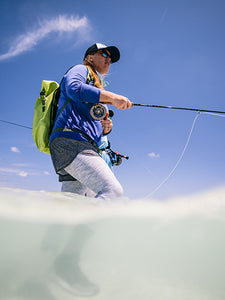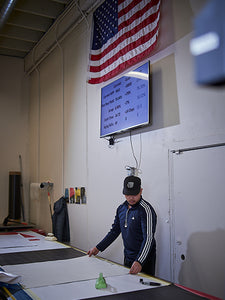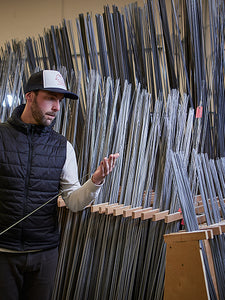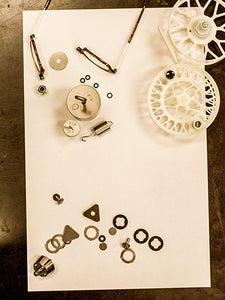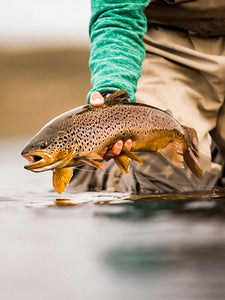"Make no mistake about it, beyond limiting your impact, being an angler today means that you must also act as an advocate, a conservationist, and a steward of the river.”

Community
One & Done : An Exercise In Good Will
Sage January 05, 2022
Chapter One
THE CONCEPT
It’s late April on a rainy and muddy forestry road in western British Columbia. The clouds above are hanging low in the sky, as they slowly peel through the trees that line the sub-alpine layer in the valley. There’s a distinct spring sweetness in the air. Unstrapping our whitewater-ready raft from the trailer, we can hear the white noise of the river’s riffle just above the boat launch. It’s massive. And the white noise alone is telling of the river's unstoppable power. This glacial river follows through the valley floor as a vein of sustenance for everything in its path. Within its teal current, there are special, entirely unique creatures that some people will simply never be fortunate enough to encounter. That’s a fact. However, for those fortunate few who have become cursed with a desire to pursue these wild animals - the fabled steelhead - there comes with it an inherent duty to also act as a steward on its behalf. The only question remaining is: what does this stewardship look like?
Let’s rewind a bit. Earlier this year, in the throes of my own local fishery’s coastal winter steelhead season, I proposed an idea on the modern-day conservation cannon (social media). The idea is not proprietary, nor am I the first person to propose it. However, it is a simple idea: once you have brought a steelhead to hand, you put your rod down for that day. Fish a dry fly with a clipped hook or maybe just kick back and have a beer or a stogie. Either way, the idea is a roundabout way to promote recreational angling for future generations, while still mitigating your pressure on the resource. This approach is referred to as "One & Done."
Rest assured, I received all kinds of feedback when I posted about this idea. You bet, it was good, bad and ugly. That said, while I have you here, I’d like to note a couple caveats: The first is that I don’t propose this should be implemented as a regulation. It’s hard to enforce and fishery systems vary greatly. I was specifically recommending this as an opt-in practice for wild winter-run steelhead for those who are so inclined, on my home rivers in BC which have no active steelhead hatcheries. You should still remove hatchery fish from rivers where regulation allows.
And the second caveat is that, in practicing a One & Done approach, I’m not necessarily suggesting that people should fish fewer days. Hell, fish more days… It’s super fun and deeply cathartic for those who still have remaining genes which carry their forefathers’ hunter-gatherer tendencies. Get out there solo or with your friends.
You should scratch that itch. And there aren’t many ways to scratch that itch in the way that hunting a wild animal with a well-crafted fly rod will. It requires an immense amount of skill, knowledge, tutelage, persistence, and most importantly, a deep connection to the land.






Chapter Two
THE CASE STUDY
Let’s pick back up to the summer of 2021 and move a bit further north. One of the most prolific steelhead runs in the world, the incredible Skeena River, indicated that its migratory fish return would be far below escapement goals (meaning, the number of salmon that “escape” fisheries and return to freshwater to spawn). Upon hearing this, as someone with a connection to this river and its stunning tributaries, I found myself in a profound contradiction of emotions. Getting down to it, the Ministry of Forests, Lands, Natural Resource Operations and Rural Development (who oversees the fishery) decided to open the fishery for an abbreviated recreational steelhead season. Included in this were a number of regulatory changes and recommendations. One of these recommendations (you can probably see where I’m going here), was for anglers to adopt a “One & Done” approach.
Amidst this opening, there were a lot of voices participating in the conversation. Some of which were anglers choosing simply not to fish, claiming that the fishery shouldn’t even be open to recreational anglers. It’s a touchy subject here, and with everyone having a voice these days, well, let’s just say the pot got stirred. And we now had an official One & Done recommendation on arguably the most storied, prolific steelhead fishery in the world.
When you look objectively at the decline, it’s important to note that the causes of these low returns are from a number of factors... And some are more impactful than others. These factors include deforestation of river habitat, hydro dams, global warming, commercial fishing (and bycatch), and the use of gill nets for harvesting. The truth of the matter is, considering these factors, single-barbless-hook catch-and-release recreational angling has a relatively small impact on the fish. That said, one must understand that while recreational anglers do have a small impact on the fish, they also act as steward... a critical bellwether for the resource.
Considering the impact from these factors, if you close a fishery to recreational angling, it’s not going to solve the problem. You can remove the anglers, yet the runs will keep trickling down and down. You would be hard-pressed to show me any closure of a river to recreational angling that has brought back stocks. What we need are big, impactful changes. If we are really serious about saving these fish, we need to ban the usage of gill nets (and any other non-selective methods of harvest). We need to limit deforestation near fish habitats. We need a re-evaluation of commercial fishing practices. We need the removal of dams and fish farms. And we need to demand better, science-based decision-making at all levels of government to prioritize the resilience of key species like wild steelhead. This is not a case of whataboutism. These are the changes that will actually move the needle during a time of need. And they are within reach.
For me personally, this manifested in donating half of my pay from this year’s commercial work on the Skeena tributaries via the Coast to Clouds Conservation Foundation (C2C). C2C distributes funds to organizations such as the Native Fish Society, Skeena Wild, the Steelhead Society of BC, as well as directly funds projects like the Lower Skeena Pound Trap. This pound trap acts as a gill net replacement to promote more sustainable harvesting practices. Beyond this, I continue to donate a portion of my work time and royalty-free usage of my creative assets to a handful of other conservation organizations.
However, if you remove these recreational anglers (beneficiary-stewards) from a river, it’s like removing the canary from the coal mine… This will only quiet the ones who are sounding the alarm. They are also the ones who are willing to get dirty and do the work to save these fish.
In this year’s case, with the Skeena fishery open for a shortened season, anglers do need to be aware of their potential impacts and limit themselves accordingly. There is something especially commendable about reducing your effectiveness. And I think that’s very appropriate right now for a lot of fisheries. But in either case, do not remove yourself from your stewardship of the resource. Keep your boots in the water and keep fighting for the fish. You’ll do more good fighting for them with a rod in your hand than you will in silence.






Chapter Three
THE ACTION
Returning home from my own stint in the Skeena valley this year, it was an emotional departure. With my gear loaded up from my last stop of the tour at the Babine Steelhead Lodge, I ran back inside to say farewell to my friend Tom Derry, with whom I had shared a wall-tent on the grizzly-laden Babine for the previous week. Tom, the host of the lodge, also happens to be a passionate river steward on behalf of the Native Fish Society.
When I popped my head inside and saw Tom, knowing I was leaving, he jokingly said, “Chase where ya going??”. I couldn’t help but tearfully laugh. With a three-month-old son waiting for me at home, I pushed past some emotion and told him that I’m headed home to raise the next generation of steelhead angler. I guess in some way, that was me telling him that I’ve still got hope.
It’s with these people that I can’t help but reflect back on my home fishery. How lucky are we to even have a One & Done opportunity to fish? And how beautiful of a way is it to connect with the land?
Knowing how relatively minimal the impact is on these fish from my personal angling compared to these big factors, like the devastating bycatch from gill nets, it can be a tough pill. But the truth is, even if the recreational angler impact is low, practicing One & Done on sensitive fisheries is still a good exercise in good will. If nothing else, it’s a token of good faith that says, I’m committed to limiting my own impact too. And for that reason, while it will certainly not alone bring these fish returns back, that is what I’m personally committed to in my own cathartic hunt for these incredible wild fish. I guess my point here is this: while we need much more than One & Done, it’s a damn good start.
Make no mistake about it, beyond limiting your impact, being an angler today means that you must also act as an advocate, a conservationist, and a steward of the river. If you fish, it is your responsibility to do what you personally can to promote public investment in watershed and population restoration. So for you personally, what does this stewardship look like?
Editor's note: These are my thoughts and my thoughts alone. That said, I’m committed to a two-way conversation about the best ways to unite anglers and protect wild fish in a balanced, expedient, and realistic way. I would love to hear from you on your thoughts. Did I miss something? What do you agree with me about? What do you disagree with? Please reach out to me directly with your thoughts on my Instagram below.
@ANADROMOUS
Words & Photography
Chase White is a commercial and editorial outdoor photographer based on the west coast of British Columbia. Often documenting the places and experiences that define The British Columbia experience, he draws his creative inspiration from nature and the outdoor pursuits that make people feel thrilled to be alive. His work has been featured in publications, films, and brands around the world. As an avid fly angler himself, when Chase is not working, you can likely find him on his home river with his wife Lindsay and their pup Ted on the hunt for an encounter with a wild fish.






